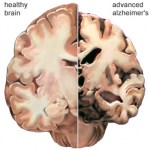Alzheimer's
Check out this video from Reuters (via YouTube). It summarizes an exciting study from researchers at Imperial College London who were able to stop the progression of Alzheimer's disease in mice by administering a modified virus to the animals. The virus worked by preventing the formation of the characteristic amyloid plaques that are responsible for causing damage to neurons in the brain. Importantly, the virus did not result in loss of existing brain cells. It will be interesting to see how this research progresses and whether the treatment will not only be safe, but effective for humans…
A few of the recent pieces I've liked:
Melissa Harris-Perry in Elle and before the Congressional Caucus for Black Women and Girls: How Our Country Fails Black Women and Girls
N.R. Kleinfeld in The New York Times: Fraying at the Edges (“A withered person with a scrambled mind, memories sealed away: That is the familiar face of Alzheimer’s. But there is also the waiting period, which Geri Taylor has been navigating with prudence, grace and hope.”)
Oliver Laughland and Mae Ryan in The Guardian: Workers fight for dignity in Trump's Las Vegas hotel: 'You don't talk to the boss'
Emily Peck in…
“Inclusion bodies – those clumps of protein that are found in the brain cells of Alzheimer’s patients – are, sadly, a product of aging,” says Dr. Maya Schuldiner. “They can form naturally in practically all cells, but when these cells get old, the mechanism for clearing them away starts to fail.”
That is not great news for those of us who are already seeing signs of incipient dementia every time we forget a name or misplace our keys. But of course there is good news too. Schuldiner has discovered a “detergent” that cells make to wash away those nasty protein clumps. And she believes that, in…
I recently received the following question from a reader based on a prior blog entry on how a medication used to treat epilepsy also helps reverse memory loss with Alzheimer's disease. You can see the original blog here
Question:
"I find it a little confusing as to how it is possible that this medication can improve brain and memory function but at the same time cause cognitive impairment? Is that not contradictory that the meds are suppose o help the brain but the side effects are related to the brain? Did the research account the facts that humans do not share all the same proteins as…
"Art enables us to find ourselves and lose ourselves at the same time." -Thomas Merton
Whatever your creative outlets are -- music, painting, photography, drawing, or even writing, to name a few -- I hope you get to enjoy them frequently. There's nothing like engaging your imagination and creativity, although I have to admit that I speak of this only from my own anecdotal experience, not from any scientific knowledge that I have. That's part of why each weekend I give you a song to listen to; today I give you Josh Harty's unique Roots/Americana composition,
Last Known Address.
But this…
Image from: Alzheimer's Association
Researchers Sanchez et al. from the Gladstone Institute, University of California San Franciso and Washington University School of Medicine discovered that an FDA-approved anti-convulsant medication used to treat epilepsy (levetiracetam) can also reverse memory loss in addition to reducing other Alzheimer's related symptoms in a mouse model of the disease.
Alzheimer's is currently the most common form of dementia (memory loss) representing 50-80% of cases. It is a disease that worsens over time. Although there are available medications…
A new study identifies a likely cause of rapid degeneration in some Alzheimer's patients. The results of this study may lead to improved treatment.
But first, let's look at the method used in this study, because that may be almost as important as a development. And for this, we will use a sports analogy.
Let's say there's an allele (an allele is a variant of a gene) that can boost your ability to play baseball. It really works. It causes an eye-hand coordination thing that improves batting, catching, and also affects your perception of movement in 3D space so you never miscalculate…
Neurodegenerative diseases (i.e. Alzheimer's and Huntington's) often involves the formation of aggregates of proteins in a patients' brain, correlated with the process of degeneration. Some of these proteins are unique to the specific disease and others are commonly found in healthy individuals but also occur intertwined with the disease-linked types. Until now, these "common proteins" were thought to be an effect of sampling the tissues and were ignored as background. A new paper out today in PLoS Biology suggests, however, that these protein aggregates may be linked to aging. The main…
People infected with the bird flu virus - influenza A subtype H5N1 - go through the usual symptoms of fever, aching muscles and cough. The virus is so virulent that 60% of infected humans have died. But according to a study in mice, the infection could also take a more inconspicuous toll on the brain, causing the sorts of damage that could increase the risk of diseases like Parkinson's and Alzheimer's many years after the virus has been cleared.
The link between influenza and Parkinson's disease is hardly old but certainly controversial. Previous studies have found no traces of flu genetic…
Alzheimer's research is an ongoing field. Although we know a lot more than we used to, we still don't entirely understand why the accumulation of proteins in Alzheimer's disease kills neurons or renders them non-functional. One intriguing part of the explanation may be offered by Varvel et al. who show that the active proteins in Alzheimer's disease (more on this in a second) cause neurons to re-enter the cell cycle in a mouse model of the disease.
Introduction
I have variously described Alzheimer's -- and other neurodegenerative diseases -- as a disease of molecular crud. The pathological…
Here is an interesting approach to fighting Alzheimer's disease: use adjuvants to activate microglia in the nasal cavity.
Frenkel et al. publishing the Annals of Neurology show that the administration of an adjuvant called Protollin into the nasal cavity of both young and old mice transgenically engineered to get Alzheimer's disease can reduce the plaque burden and improve the disease.
There has been a lot of interest in using the immune system to help treat Alzheimer's disease, but the technique has some major and perhaps insurmountable risks. I talked before about how Alzheimer's is a…
One of the more common questions I get is why they haven't found any drugs to treat Alzheimer's disease. (But they have, haven't they? What about cholinesterase inhibitors like Aricept? Ed. Those drugs mask the symptoms of Alzheimer's disease, but they do not change the clinical course.) Drug companies are particularly gifted at finding molecules to inhibit all the enzymes in our bodies. We know the enzymes involved in the etiology of Alzheimer's (as I will explain in a second). Why can't we inhibit them?
The problem with inhibiting the enzymes involved in Alzheimer's and hence treating…
This paper was covered by CNN last week, and I didn't have a chance to talk about it then. It is a case study by Tobinick and Gross in the Journal of Neuroinflammation where a patient with Alzheimer's disease (AD) injected intrathecally (into their spinal fluid) with a TNF-alpha antagonist called etanercept showed rapid and consistent improvement in cognitive function.
I want to talk both about the reasons for skepticism and for optimism in this study.
Tobinick and Gross describe an 81 year old patient with late Alzheimer's disease. The patient was being treated with intrathecal…
You look away from a field for two seconds, and they get all crazy on you... I used to do only molecular biology focusing primarily on neurodegenerative diseases like Alzheimer's. Since I moved to a lab that studies behavior, I haven't been keeping up with the literature of Alzheimer's as much as I should so I was struck with how clever this paper is.
Sagare et al. look at a new way to lower the A-Beta levels in Alzheimer's disease by putting a recombinant protein into the blood that binds it. A-Beta is the protein in Alzheimer's disease that forms plaques and causes the pathology by…
Finally we get some data on changes in AD pathology with statin use! Statins are taken for lowering cholesterol, but they have other beneficial effects such as modulating inflammatory responses. Thus, they could prove beneficial in the treatment of AD given the disease has a significant inflammatory component.
According to the press release
The two changes in the brain that are considered the most definitive hallmarks of Alzheimer's are brain "plaques" and "tangles." After controlling for variables including age at death, gender, and strokes in the brain, the researchers found…
We all know that inhaled anesthesia is over the short-term impairs neurological function; that is sort of the point using it for surgery.
However, a debate exists about whether inhaled anesthetics have long-term neurological consequences as well. In light of that debate Bianchi et al, publishing in the journal Neurobiology of Aging, have shown that in a mouse model of Alzheimer's disease some anesthetics increase histological measures of severity. Before you get excited though, let me tell you that the results are mixed.
Background
An important point to understand in this paper is that…


